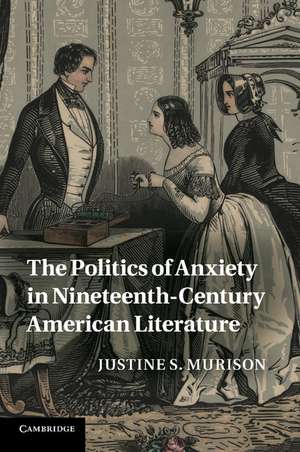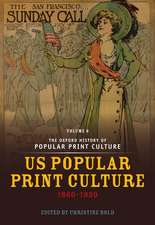The Politics of Anxiety in Nineteenth-Century American Literature: Cambridge Studies in American Literature and Culture, cartea 162
Autor Justine S. Murisonen Limba Engleză Paperback – 18 dec 2013
| Toate formatele și edițiile | Preț | Express |
|---|---|---|
| Paperback (1) | 281.88 lei 6-8 săpt. | |
| Cambridge University Press – 18 dec 2013 | 281.88 lei 6-8 săpt. | |
| Hardback (1) | 694.23 lei 6-8 săpt. | |
| Cambridge University Press – 20 apr 2011 | 694.23 lei 6-8 săpt. |
Din seria Cambridge Studies in American Literature and Culture
-
 Preț: 231.60 lei
Preț: 231.60 lei - 8%
 Preț: 530.11 lei
Preț: 530.11 lei -
 Preț: 374.90 lei
Preț: 374.90 lei -
 Preț: 282.10 lei
Preț: 282.10 lei -
 Preț: 456.72 lei
Preț: 456.72 lei -
 Preț: 237.68 lei
Preț: 237.68 lei - 11%
 Preț: 689.93 lei
Preț: 689.93 lei - 8%
 Preț: 530.25 lei
Preț: 530.25 lei - 9%
 Preț: 592.24 lei
Preț: 592.24 lei -
 Preț: 163.91 lei
Preț: 163.91 lei - 9%
 Preț: 592.73 lei
Preț: 592.73 lei -
 Preț: 284.01 lei
Preț: 284.01 lei - 9%
 Preț: 592.24 lei
Preț: 592.24 lei -
 Preț: 284.01 lei
Preț: 284.01 lei - 14%
 Preț: 688.24 lei
Preț: 688.24 lei -
 Preț: 328.46 lei
Preț: 328.46 lei - 9%
 Preț: 594.37 lei
Preț: 594.37 lei -
 Preț: 305.12 lei
Preț: 305.12 lei -
 Preț: 389.55 lei
Preț: 389.55 lei -
 Preț: 343.63 lei
Preț: 343.63 lei -
 Preț: 346.90 lei
Preț: 346.90 lei -
 Preț: 286.69 lei
Preț: 286.69 lei -
 Preț: 283.79 lei
Preț: 283.79 lei -
 Preț: 288.04 lei
Preț: 288.04 lei - 14%
 Preț: 684.76 lei
Preț: 684.76 lei -
 Preț: 287.87 lei
Preț: 287.87 lei -
 Preț: 313.25 lei
Preț: 313.25 lei -
 Preț: 348.47 lei
Preț: 348.47 lei -
 Preț: 306.10 lei
Preț: 306.10 lei -
 Preț: 352.50 lei
Preț: 352.50 lei -
 Preț: 281.12 lei
Preț: 281.12 lei -
 Preț: 281.49 lei
Preț: 281.49 lei -
 Preț: 303.21 lei
Preț: 303.21 lei -
 Preț: 317.49 lei
Preț: 317.49 lei - 11%
 Preț: 694.23 lei
Preț: 694.23 lei
Preț: 281.88 lei
Nou
Puncte Express: 423
Preț estimativ în valută:
53.94€ • 56.11$ • 44.53£
53.94€ • 56.11$ • 44.53£
Carte tipărită la comandă
Livrare economică 14-28 aprilie
Preluare comenzi: 021 569.72.76
Specificații
ISBN-13: 9781107694149
ISBN-10: 1107694140
Pagini: 230
Dimensiuni: 152 x 229 x 12 mm
Greutate: 0.31 kg
Editura: Cambridge University Press
Colecția Cambridge University Press
Seria Cambridge Studies in American Literature and Culture
Locul publicării:New York, United States
ISBN-10: 1107694140
Pagini: 230
Dimensiuni: 152 x 229 x 12 mm
Greutate: 0.31 kg
Editura: Cambridge University Press
Colecția Cambridge University Press
Seria Cambridge Studies in American Literature and Culture
Locul publicării:New York, United States
Cuprins
Introduction; 1. A bond-slave to the mind: sympathy and hypochondria in Robert Montgomery Bird's Sheppard Lee; 2. Frogs, dogs, and mobs: reflex and democracy in Edgar Allan Poe's satires; 3. Invasions of privacy: clairvoyance and Utopian failure in Antebellum romance; 4. 'All that is enthusiastic': revival and reform in Harriet Beecher Stowe's Dred; 5. Cui bono?: Spiritualism and empiricism from the Civil War to American nervousness; Epilogue: the confidences of anxiety.
Recenzii
"In this fascinating study, Justine Murison investigates the various discourses surrounding the workings of and roles played by the nervous system in nineteenth-century literature and culture. In the course of tracing circuits of exchange between body and mind, individual and surrounding environment, she calls attention to a variety of applications for new, oftentimes contested, understandings of physiological integrity and vulnerability in the era’s cultural, national, and political movements....Murison’s attention to “the role of embodiment in constructing social, historical, and most of all, fictional narratives” (p. 12) reflects the fact that her project is part of a very big, field-changing, post–“neuroscientific turn” (p. 175) methodological approach, and it’s exciting work to watch unfold."
-Maura D’Amore, THE NEW ENGLAND QUARTERLY
-Maura D’Amore, THE NEW ENGLAND QUARTERLY
Notă biografică
Descriere
Murison explains the impact of neurological medicine on nineteenth-century literature and culture, particularly Hawthorne and Beecher Stowe.


















